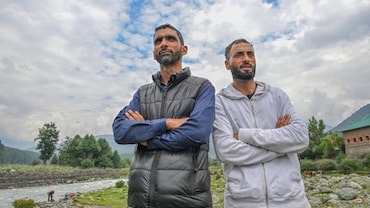- HOME
- /
- True Stories
- /
- Heroes
- /
Lockdown Heroes: Bankers At The Doorstep Of The Poor
For lakhs of villagers across the country, they are providing a service few people can at this time
 Ravindra Nath Yogi (seated) at his shop
Ravindra Nath Yogi (seated) at his shop
Mohammed Mufeed, a 'business correspondent' or 'bank mitra' of the Punjab National Bank, is the most awaited visitor in seven villages of Bharatpur district in Rajasthan. A resident of Pathrali, Mufeed sets out on his bike every day, to help villagers who are hamstrung by the lockdown and the fear of the coronavirus. His goal: to help them withdraw, or, in some cases, deposit money in their bank accounts.
The concept of business correspondents (also called bank sakhis) is more than a decade old, but their relevance is being felt now, more than ever before. And people like Mufeed are acting as last-mile connectors of the Indian banking system. They play an important role that can be gauged from what Mufeed says. "I can say that these days, I am the most awaited person in these villages. They have no other source of cash as they are confined to their homes," he says.
"I travel around 35–40 kilometres per day and visit all the villages. Most of the people who withdraw money are small-time farmers, labourers and beneficiaries of various government schemes," says the 30-year-old.
Mufeed goes about his work daily, hoping that things will go off smoothly. But that is not often the case. "The police are on the edge, so are the people. Despite procuring all the permissions and documents, I still face problems, but I carry on, as I know that I am the only one who can help with cash in hand," says Mufeed. He says that people withdraw anywhere between ₹10,000–₹1 lakh per day.
He always wears a mask and gloves and carries a laptop, a biometric device, a hand sanitizer and, of course, cash. “I have to remind customers often that they have to wear masks, clean their hands. Only then will they be allowed to touch the device," he says. "They obey my instructions as they know I am their true mitra (friend)," he adds.
***
700 kilometres south of Pathrali, Ravindra Nath Yogi, 40, in Kharsodakalan village in Madhya Pradesh's Ujjain district, is also one of the most sought-after persons in his village.
"Generally, the poor, who only have a few hundred or thousand rupees in their accounts, come to me. They feel happy that they do not need to go far from their homes to withdraw money," he says. Yogi withdraws the money from a branch in Mungawada, around nine kilometers from his village and disburses it to those in need. Anybody with a bank account and Aadhaar card can withdraw or deposit money with these correspondents.
It's a job Yogi has been doing for a few years now, but the coronavirus pandemic and the lockdown have complicated things. "People are very scared as we keep hearing stories about people contracting the disease a few kilometers from my village. I have to keep assuring them that our system is very safe and I also take adequate precaution," he says.
He explains that anyone who comes to collect the money needs to wear a mask. Both sides need to wash their hands with soap, he says, before adding that soaps and masks are provided in front of his small shop. They also have to sanitize their hands before they register their fingerprint on the biometric device.
Yogi, who once wanted to join the Indian Army, says that he now feels like a soldier on the battlefield. "It's a warlike situation, and my job is to see to it that people get their money whenever they need it," he says.






